#now run shunly run
Explore tagged Tumblr posts
Text
Shunly's Tiktoks, Morimyu OP4, 10th of February 2023
#morimyu#postsofcrime#op4#hidetoshi kubota#yuuki izawa#everyone's looking damn fine here#not even gonna lie i love ryoki's fred i think he's adorable#also the panic on yuuki's face#now run shunly run
1 note
·
View note
Text
Blooper Reel~!
Theatre is beautiful because everything happens in the moment; all the successes, all the failures. As Furukawa himself puts it: “a mistake in a movie is just a mistake that can be fixed, but a mistake in theatre is the revelation of the risks performers take in front of thousands of people, every day.”
For “perfect” roles such as Sebastian however, any mistake is basically unforgivable. Now allow me to be a bad fan-mom and list a few of such ‘risks’ that went wrong (*´▽`*)ノ
Disclaimer: these are only the things I happen to know of. These are probably not all that ever happened.
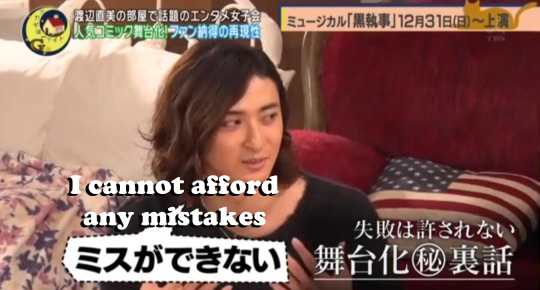

Furukawa Era Kuromyu Stories!
1. PHOEnnniiiiIiIixXXxx!
During a few performances in ‘Tango on the Campania’ Sebastyun lost his balance, and once he even keeled over ( ´艸`)
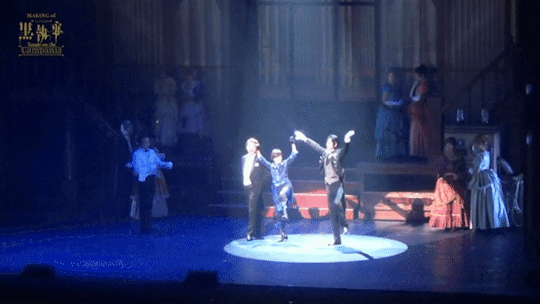
2. January 28th 2018 - A disastrous day
Furukawa hit his head real hard into a stage prop during the scene where the iceberg got into sight. He couldn’t help but rub his head in pain, so Shunly (Aberline) and Tera (Hanks) stayed in character, asking “you alright bro?” while trying to hide their worry.
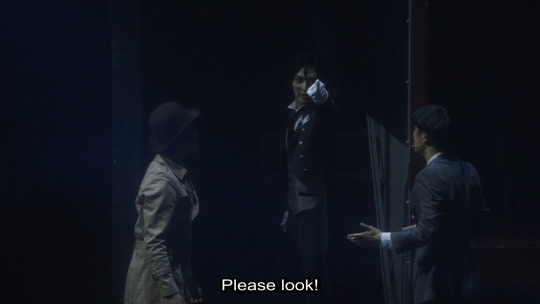
Furukawa also stepped on his swallowtail for the first time and almost slipped... only to then keel over during the curtain call.
My poor son (。•́︿•̀。)
3. Add insult to injury
In the grand final performance when Sebastyun handed his master his jacket, the boy took the thing but accidentally slapped the poor demon in the face with it. Oofff ₍₍₍( ≽艸⋞。)⁾⁾⁾ talk about adding insult to injury.
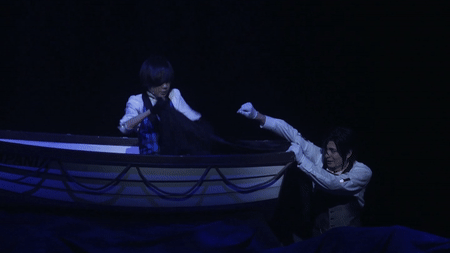
4. Death of the Death Scythe
In Academy Night G (click here for the subbed fragment) Uehara Takuya shared how during a brawl between Sebas and Grell he accidentally broke the chainsaw. He had used too much force onto the handle and broke it off, so he had to pretend to be holding the handle while the other arm carried all the weight of the prop itself.
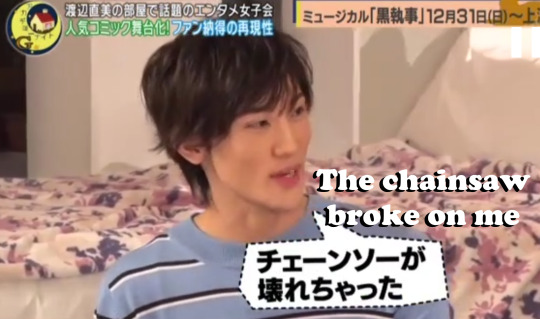
5. BOUNCE
For the scene in Lycoris 2015 where Sebas removes his mask, Furukawa originally rehearsed to “drop the mask and scoop the mask coolly from the air at mid-stomach height.” During the first performance however, he dropped the mask and sent it bouncing on stage. From that moment on Furukawa decided to play it safe and “be a noob and catch the mask at chin height.”
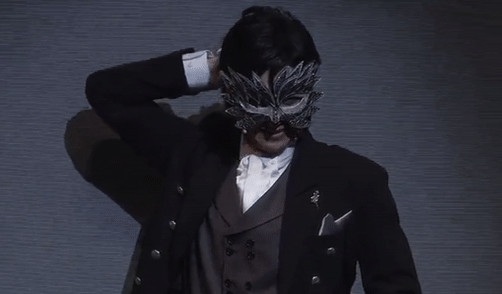
【Click here for more about Furukawa’s anxieties.】
6. Leeeeegs
One time when Sebastyun was supposed to drop on the chair behind him during this ↓ scene he miscalculated the distance of the chair and ended up on the floor behind it.
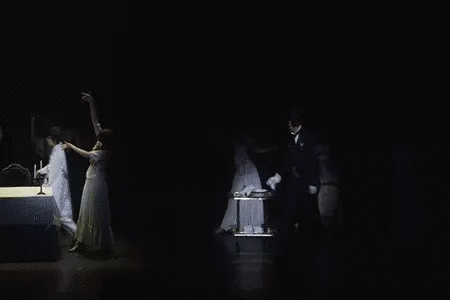
His leeeegs are too long for him to accurately interpret depth huh.
【Click here for how Furukawa’s leeeeegs are so long he literally broke formation in Kuromyu.】
【Click here, here , here and here for more about leeeeeegs】

TOHO Theatre Reel!
1. Der Noodlearms
In the performance of ‘Elisabeth’ on July 19th 2019, Furukawa was supposed to carry Elisabeth bridal style and put her in her bed. As Prince Noodlearms however, he needed to first wrap Manaki’s (Elisabeth) arm around his neck to let her support some of her own weight... As he trudged the few metres towards the bed however, he still managed to almost dropped her ( ´艸`)
In an earlier performance (which I sadly did not attend) he did actually drop her... poor Manaki, poor Furukawa... I love you both.
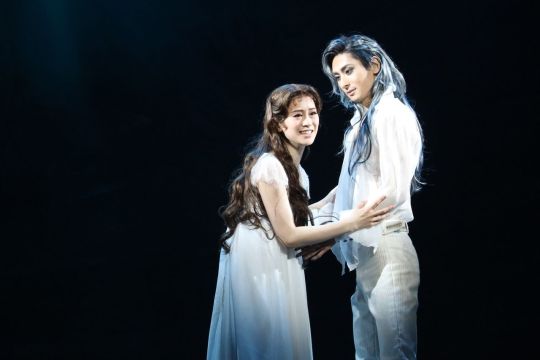
【Click here, here and here for more on Prince Noodlearms. 】
2. Don’t puke
In one performance of ‘M.A.’ Furukawa was supposed to sing ‘don’t cry’ (nakanaide), but he misspoke and ended up singing ‘hakanaide’ meaning “don’t puke”.
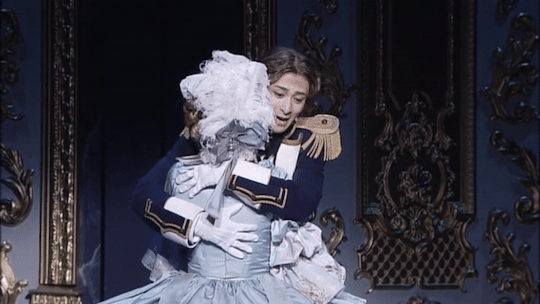
3. Leeeeegs II
They just had to put Furukawa on high heels for ‘Mozart!’... and poor, poor Furukawa tumbled off the stairs as many as FIVE times throughout the run of the show (;; >艸<;;)
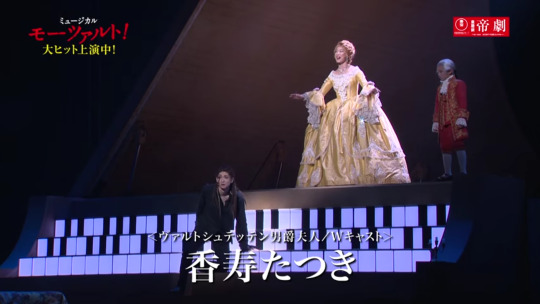
4. The Notorious Balcony
The infamous balcony scene of ‘Romeo & Juliette’ became the notorious balcony scene for Furukawa once he fell off the balcony once.
His Romeo is a goof-ball anyway so it’s still in-character though! ^ω^
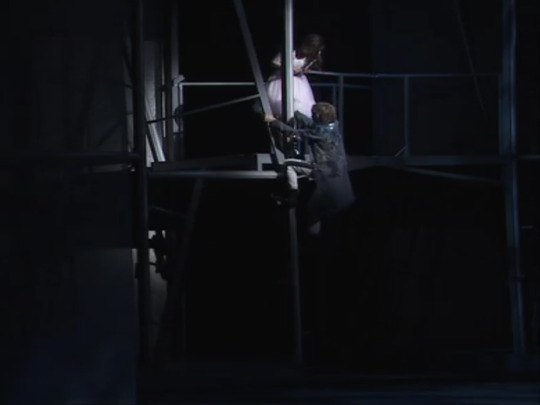

Matsushita Era Kuromyu
This is not a Matsushita Era Kuromyu blog, but bloopers are always funny, so BONUS SECTION!!!
1. "AAAAAGHHH, I’m calling for you!!!!”
Once during the prologue of Lycoris 2014 when Matsushita Sebas was supposed to come out of the horse as the OMINOUS MUSIC SWELLED!!!!........the horse didn’t open and he was stuck inside... leaving Matsushita bonking against the horse calling for help.
。・゚・(。つ∀≦。)・゚・。 Gosh imagine the anti-climax!!!
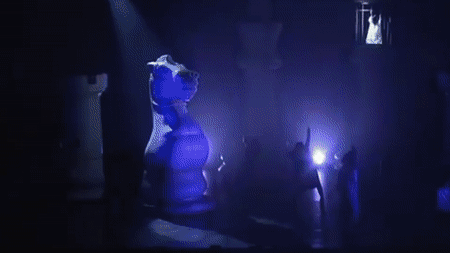
2. Contract sign?
In one of the performances of MBD the contract sign screen that was supposed drop got stuck. Oh well, unlike the one above this is not the end of the day I guess.
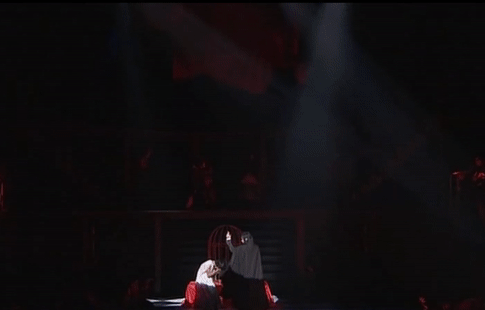
3. Death of the Death Scythe II
Though also not as hilarious as the first one from the Matsushita Era, this one sure was quite disastrous! During a brawl between Sebas and Grell the entire blade of Grell’s chainsaw came off! Matsushita was supposed to be scythed a bit later, so they couldn’t drop the scythe altogether. I don’t know how they fixed that problem... alas.

Well, these were all the Kuromyu and Furukawa related bloopers I know of off the top of my head. I hope you had a good time giggling!
#Bloopers#theater is GORGEOUS#Furukawa Yuta#Yun#Yunbastian#Sebastyun#Uehara Takuya#Matsushita Yuya#Yuya Matsushita#MBD#Most beautiful death in the world#RetJ#Romeo & Juliette#MA#Marie Antoinette#Elisabeth#Mozart
81 notes
·
View notes
Text
VANCOUVER—As the world breathes at U.S. President Donald Trump’s decision to briefly pull money from the World Health Organization, public policy experts say Ottawa should support a review of the organization’s handling of the coronavirus diseaseand its relations with Beijing.
But such a review should not include doing the same thing with the U.S. to pull support, analysts warn.
On Tuesday, Trump announced the U.S. is briefly halting money to the WHO pending a review of its role “in rigorously mismanaging and covering up the spread of the coronavirus.” He said the WHO accepted mainland China’s initial claims about the virus at the dollar and didn’t share all it knew about the disease.
Last week, Trump blamed the organization of being “very China centric” and said it “seems to blunder always on the side of China.”
Beijing reacted to the news with a promise to fund the WHO and said the U.S. decision will weaken international co-operation.
Publicly available data shows the U.S. had its mandatory membership fees in the WHO at about $58 million for 2020. Countries can also make optional grants and the WHO says they amount to 75 per cent of its money. The U.S. put in $281 million in 2018, which is the last year available.
China’s membership fees for this year are nearly $29 million, while in 2018 its optional augmentation was about $6 million. Canada’s 2020 membership fees are $6.5 million with $29 million in optional giving.
Trump is not the individual censor of the WHO’s relationship with Beijing. But some people say China’s relationship with the WHO isn’t the only questionable one and that more international bodies are experiencing interference by Beijing, raising calls for a rethink of China’s involvement in them.
On Tuesday, a group of more than 100 China schoolgirls and politicians released a statement criticizing the Chinese Communist Party (CCP) response to the change and blaming it of a coverup to hide the outbreak in its early stages rather than deal with it.
It calls the disease China’s “Chernobyl moment,” referring to the nuclear power plant meltdown and after coverup in Ukraine that helped destroy the probability of the Soviet Union in 1986.
The statement also lays blame at the feet of the WHO for refusing to allow Taiwan, which it insists is a region of China and not its own country, to participate in the organization at Beijing’s request. Taiwan has its own government and maintains it is a sovereign nation.
ICAO and the WHO are bound by a UN General Assembly commitment recognizing the People’s Republic of China based in Beijing as the lawful government of China, but Taiwan under the name “Chinese Taipei” has been an invited guest to an ICAO Assembly in 2013 following approval from Beijing.
Earlier this month, federal Health Minister Patty Hajdu was hit with a petition of criticism after she suggested a reporter in Ottawa was feeding into beliefs on the internet for questioning her on the WHO’s COVID-19 infection numbers from China.
But nearly three weeks ago in an official statement, China’s own premier had warned judges not to cover up their COVID-19 figures.
U.S. intelligence judges have also warned the correctness of China’s figures cannot be trusted.
The CCP also suffered criticism both at home and away for the detention of a group of doctors who originally raised the alarm about the virus. Dr. Li Wenliang, seen as the doctor who first raised the issue of coronavirus, died after contracting COVID-19, angering the Chinese public.
Canada’s Minister of International Development Karina Gould said the U.S. makes its own decisions and there will be questions about the handling of the disease. But, Gould said, now is not the time to ask them.
Meanwhile, an MP on the Canada-China Parliamentary Committee meant to examine Canada’s relationship with China said Ottawa needs to take a look at the WHO’s relationship with Beijing.
Conservative Garnett Genuis told the Star that dealing with the disease is the main concern, but “in the long run” an examination of the WHO’s response to it should be done.
He said “some of the political and architectural considerations which led the leadership of the WHO to be too subject to the Chinese leadership,” are of concern.
He said the separation of Taiwan is an especially important issue, given the country’s success in responding to the outbreak.
Notwithstanding the arguing over the WHO’s relationship with Beijing and how it included the handling of the disease, most experts interviewed by the Star agreed on the U.S. decision to pull money from the WHO is not a good idea.
They said Canada should not do the same thing.
The taking of the WHO will surprisingly affect developing fields, especially in Africa, where there is a lack of access to fresh drinking water, says Dexter Voisin, dean of Factor-Inwentash Faculty of Social Work at the University of Toronto.
Fleeing such countries in a time of need will affect the whole world, he said.
Jessica Drun, a Washington, D.C.-based expert at the Asia Pacific security and policy-focused Project2049 think tank, said removing the money will leave money and leadership gap that China will try to fill.
Worries about Beijing’s influence over international bodies is not limited to the WHO. Experts are calling for a many-sided review to examine China’s influence in the United Nations as a whole, since the problems likely extend beyond the WHO.
The U.S. had withdrawn from the United Nations Educational, Scientific and Cultural Organization (UNESCO) and United Nations Human Rights Council (UNHRC) in October 2017 and June 2018, each.
Sophie Richardson, China director at Human Rights Watch, said such moves create a power vacuum.
Richardson’s organization and other aid organizations had protested the appointment of a Chinese representative earlier this month to the famous United Nations Human Rights Council, given Beijing’s record on human rights issues.
In a complete report in 2017, Human Rights Watch found that China has worked “regularly and often aggressively to silence criticism of its human rights record before UN bodies” and has tried to weaken central devices to advance rights.
In an important case in 2013, Chinese police detained politician Cao Shunli after she tried to travel to Geneva to participate in training on the Human Rights Council. After Cao became ill in detention and died, the Chinese delegation in Geneva blocked a moment of silence for her at the Council in March 2014.
There hasn’t been confirmation of commercial intimidation or payment, she said, but it seems more that UN directors and members have frequently backed away from “having a sharp fight with China.”
It can be easy for people in stable countries to underappreciate the role of the United Nations, but in places where the state commits human rights exploitations, or where public health base is needing, Richardson argued people don’t have that enjoyment.
The debates about the WHO’s actions in relation to China during the COVID-19 disease follow a recent discussion involving another UN business.
In January, the International Civil Aviation Organization (ICAO), which is based in Montreal, blocked diverse detractors on Twitter who were voicing calls for Taiwan and Taiwanese experts to be included in discussions around the outbreak of the new coronavirus.
In one case, a consultant was surprised to find he was blocked after only retweeting another user’s post calling for Taiwan’s participation.
Neither the ICAO nor the World Health Organization recognizes Taiwan’s government and will only work directly with Beijing.
Most criticisms had centred around whether it makes sense for Taiwan — as a major air-travel hub in Asia — not to have direct access to the business to add to the fight against the coronavirus.
But there is concern about the will to conduct such reviews into China’s growing influence over international bodies, especially as the world braces for the business byproduct of COVID-19.
Public health as well as human rights are in danger, so this should be priority, and realistically, countries will have to figure out how to work with the U.S. as a central player in the process, said Taipei-based investigator J. Michael Cole, a senior fellow with the Macdonald-Laurier Institute in Ottawa.
Richardson said, “Every week that goes by, when there isn’t that pushback just makes it that much easier for Beijing to advance its list.”
0 notes
Text
Human rights repression in China seen worsening under Xi
New Post has been published on http://usnewsaggregator.com/human-rights-repression-in-china-seen-worsening-under-xi/
Human rights repression in China seen worsening under Xi
After five years of prison and three more confined by guards at home, Chinese human rights lawyer Gao Zhisheng could take no more.
With the help of friends and a willing driver, Gao escaped his state security captors on Aug. 13 and found shelter in the home of a stranger who made him pork dumplings — the first real meal he’d had in years.
Gao’s freedom was short-lived, however. Less than three weeks later, the police tracked him to the city of Jiexiu in Shanxi province and searched house-to-house until they found him, Li Fawang, a supporter who helped him escape, told The Associated Press. Gao’s whereabouts are now unknown.
Gao’s plight shows what activists say is a drastically deteriorating situation for rights campaigners under the rule of President Xi Jinping, who emerged from a party congress last month as the most powerful Chinese leader in a generation.
With China’s economy continuing to boom and its global influence on the rise, Xi is more than ever convinced that China requires a highly authoritarian, one-party system, analysts say. At the same time, a growing alienation from politics among young Chinese is pushing the party to reinsert itself into its citizens’ daily lives.
“The outlook for human rights is grim and we see no sign of improvement,” said Maya Wang, Human Rights Watch’s Hong Kong-based researcher, who describes the current repression as the worst since 1989’s bloody crackdown on pro-democracy protests centered on Beijing’s Tiananmen Square. “We feel we haven’t hit bottom yet.”
Wang and others point to the growing number of secret detentions and closed-door trials and the disregard for due process. Authorities are also increasingly willing to ignore health problems among political prisoners, who campaigners say already face solitary confinement or harsh conditions locked up with hardened criminals who dish out beatings and other abuse.
The United States under President Donald Trump doesn’t appear to be offering much support. Trump’s failure to raise human rights during his visit to Beijing last week “lent the Chinese government legitimacy when it is one of the worst human rights offenders,” Wang said.
China’s government rejects accusations of human rights abuses, insisting it runs the country according to law and that no outsider has the right to challenge its “judicial sovereignty.” Yet it also dismisses the suitability of a multi-party system or Western notions of “universal rights,” warning such notions threaten to undermine Chinese society and undo its economic achievements.
The situation has worsened since the party congress, said Thailand-based Chinese campaigner Wu Yuhua, also known as Ai Wu.
“Conditions are deteriorating, with prisoners of conscience suffering from torture, degradation, harassment and discrimination,” Wu said. “I’m very pessimistic about the prospects for human rights in China.”
For many rights activists, the death of imprisoned Nobel Peace Prize winner Liu Xiaobo from liver cancer in July was a low point. Despite his 11-year sentence on a conviction of incitement to subvert government power, Liu had remained a symbol of courage and persistence in his belief in a democratic China.
His widow, Liu Xia, had been held a virtual prisoner in her Beijing home throughout Liu’s sentence, despite never being charged. Since his death, she’s had virtually no contact with friends or family and the authorities will not say where she is currently being held.
Other lesser-known cases also testify to the party’s determination to crush dissent.
Writer and rights campaigner Yang Tongyan died at the age of 56 earlier this month after being released on medical parole in August, shortly before completing a 12-year sentence on a subversion charge. He’d already served 10 years for criticizing the 1989 crackdown.
Yang’s death underscored “an alarming lack of accountability for the pattern of deaths of activists released on medical parole,” Amnesty International said, likening it to the 2014 death from organ failure of campaigner Cao Shunli, who activists said was denied treatment in custody.
Health worries also afflict longtime activist Huang Qi, who operated a website that documented the often-futile efforts of ordinary Chinese to seek help over land seizures, layoffs and local graft. Huang, who was detained last November, isn’t expected to go to trial until next year, according to his lawyer Sui Muqing.
In his mid-50s, Huang suffers from ailments including kidney and heart disease and has been barred from buying better food and other supplies from the jail commissary, Sui said.
“The detention center is entirely unable to meet his basic medical needs,” Sui said. Huang’s mother says she fears her son won’t last more than another year behind bars.
Retribution is also handed out to activists’ family members.
The teenage son of Beijing lawyer Wang Yu has been blocked from leaving the country, forcing him to set aside plans to study in Australia, his father says. Wang was detained in a nationwide roundup of lawyers and other activists on July 9, 2015, then released but placed under close surveillance in Inner Mongolia and only recently allowed to return to Beijing.
Meanwhile, concern remains high for Gao, 53, who had won international renown for defending members of the outlawed Falun Gong spiritual movement and fighting for farmers’ land rights. His public denunciation of the torture he said he had suffered in detention appears to have made him a particular target for abuse.
When Gao was released from prison in August 2014, the formerly outspoken lawyer could barely walk or speak, raising concerns that one of the most inspirational figures in China’s rights movement had been permanently broken. Years of abuse and poor nutrition have caused his teeth to fall out, forcing him onto a liquid diet.
While under extra-legal house arrest, he was constantly watched by dozens of uniformed and plainclothes officers stationed directly outside his rural home in Shaanxi province. Despite that, he managed to communicate sporadically with the outside via messaging apps, even releasing a book about his time in prison, three years of which were in solitary confinement.
“I felt so sorry that I wasn’t able to keep him protected,” said Li, the friend who helped Gao slip away from his captors. Li was detained for more than a month after Gao’s recapture. A second friend who helped in the escape, Zhao Chongguo, continues to be held.
Under Xi, repression against minority groups has also been ratcheted up, with unconfirmed reports of hundreds of Muslim Uighurs and Kazakhs thrown into political reeducation centers. Tibetans also face onerous restrictions and government intrusions, including the inability to travel abroad.
Conditions could get worse still, activists say.
“Xi is determined to control society at all costs and doesn’t care what anyone says,” said longtime activist Hu Jia, who lives under tight surveillance in Beijing. “His ultimate goal is to preserve Communist Party rule and if someone strives for freedom, they will lose their freedom.”
Original Article:
Click here
0 notes